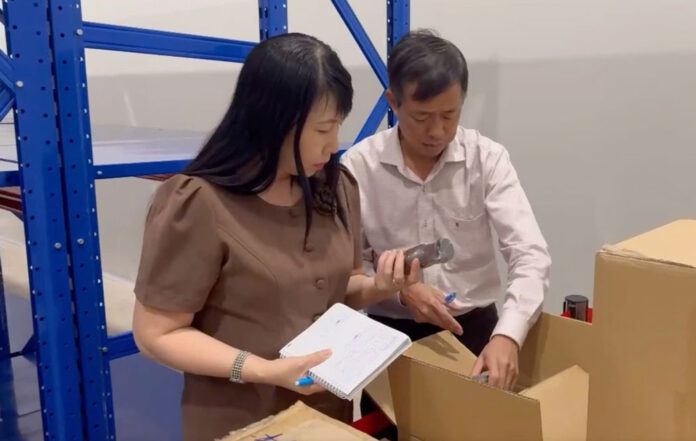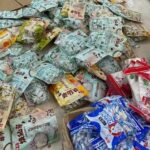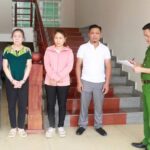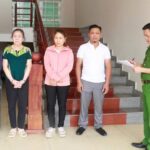According to a report from the authorities, in the first four months of 2025, agencies and localities detected and handled over 34,000 cases of violations, initiating criminal proceedings in nearly 1,400 cases, involving more than 2,100 subjects. A series of serious and major typical cases have been recently prosecuted.
Greed Ignores Consequences
The Ministry of Public Security has initiated a prosecution for the case of “Production of counterfeit goods as food” and “Cheating consumers” occurring at Asia Life Company, Chi Em Rot Company, and some related companies in Ho Chi Minh City and Dak Lak province. In this case, famous and influential people on social networks have been prosecuted and detained, such as Miss Nguyen Thuc Thuy Tien, Pham Quang Linh, also known as Quang Linh Vlogs, a member of the Board of Directors of Chi Em Rot Company, and Nguyen Thi Thai Hang, also known as Hang Du Muc, Chairman of the Board of Directors of Chi Em Rot Joint Stock Company, for the crime of “Cheating consumers.”
According to the competent authorities, Kera vegetable candy dietary supplement is a product of Nguyen Thuc Thuy Tien and Chi Em Rot Company’s shareholders’ joint venture. In which, Miss Thuy Tien enjoyed a profit share according to the capital contribution agreement, equivalent to 30%, and the remaining shareholders contributed 70% of the capital. After launching the product, Miss Thuy Tien, together with Nguyen Thi Thai Hang and Pham Quang Linh, provided misinformation to exaggerate the product’s effects. The police determined that Chi Em Rot Company sold more than 135,000 boxes of Kera candy, with a total revenue of nearly VND 18 billion, of which Nguyen Thuc Thuy Tien received a commission of nearly VND 7 billion.
On April 26, the Ministry of Public Security initiated a prosecution and detained Nguyen Nang Manh (General Director of MegaPhaco Company, Chairman of the Board of Directors of MediUSA Company) and Do Manh Hoang (Director of MediPhar Company) and two others for “Production and business of counterfeit goods” that are food, food additives, and food ingredients. The search results at warehouses and some business facilities showed that the police seized a large quantity of functional foods, diverse in types, distributed nationwide, with a total of about 100 tons of functional foods seized.
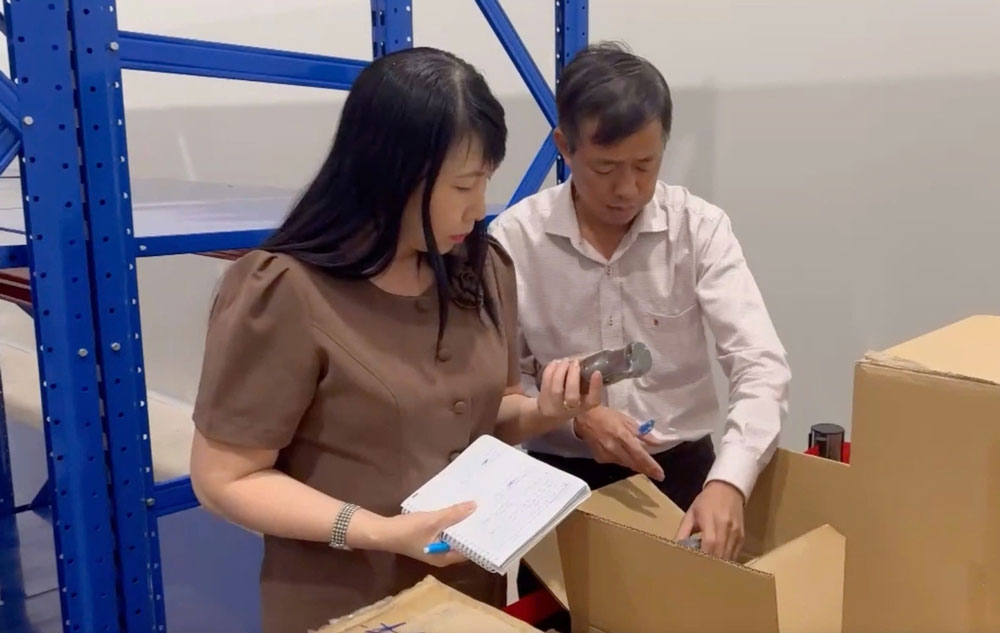
Dong Nai authorities inspect products at EBC Dong Nai Medical Equipment Factory Company. Photo: NGUYEN TUAN
Related to this case, the Ministry of Public Security later initiated a prosecution and detained former Director of the Food Safety Department of the Ministry of Health, Nguyen Thanh Phong, along with four others, for the crime of “Taking bribes”. The police determined that in order to produce and consume functional foods, Manh’s enterprise needed a GMP certificate (valid for 3 years) and a product registration form issued by the Food Safety Department. However, instead of following the regulations, the group of enterprises spent about VND 3.2 billion on some leaders and officials to bypass the errors in the assessment and post-inspection. As a result, the defendants created favorable conditions for MediPhar and MediUSA factories in the assessment, post-inspection, and granting of four certificates of establishments meeting food safety conditions and good manufacturing practices; granting 207 certificates of receipt of registration of declaration of 207 functional food products of 9 companies in the ecosystem managed by Manh.
Flood of Counterfeit Goods in the Market
Also in April 2025, the Ministry of Public Security busted a ring led by Hoang Manh Ha and Vu Manh Cuong, along with six others, involved in the production and business of counterfeit milk at Rance Pharma International Pharmaceutical Joint Stock Company and Hacofood Group Nutrition Food Joint Stock Company. According to the police, in August 2021, Cuong and Ha grasped the demand for milk powder in the domestic market. Therefore, the two defendants established Rance Pharma International Pharmaceutical Joint Stock Company (Hanoi) and Hacofood Group Nutrition Food Joint Stock Company (Hanoi) to organize the production, business, and consumption of counterfeit milk powder products. The Ministry of Public Security determined that up to now, this ring has produced 573 brands of various types of milk powder for people with diabetes, kidney failure, premature babies, and pregnant women. These milk brands are advertised and declared to contain extracts of bird’s nest, cordyceps, macadamia, and walnut… However, the actual inspection showed that the milk of the above two companies does not contain these substances, and the quality reaches less than 70% of the declared level, enough to be considered counterfeit. In about four years, the revenue from the sale of these boxes of milk is nearly VND 500 billion.
In Dong Nai province, VB Group Trading Services Co., Ltd., whose legal representative is Mr. Nguyen Quoc Vu (husband of Doan Di Bang), was found to distribute Hanayuki Sunscreen Body sunscreen and Hanayuki Shampoo shampoo products that do not meet quality standards.
Specifically, Hanayuki Sunscreen Body sunscreen (lot 0010125) declared an SPF of 50 but actually only reached SPF 2.4, nearly 21 times lower. This seriously violates the regulations on labeling and quality declaration, potentially causing sunburn and serious skin damage to users. The Dong Nai Department of Health has suspended the circulation, recalled, and destroyed this lot of products and transferred the case file to the Dong Nai Provincial Police to investigate for signs of counterfeiting.
The Hanayuki Shampoo also failed to meet quality standards for microbial limits, and the preservative 2-phenoxyethanol was detected but not listed on the label. The Drug Administration of Vietnam – Ministry of Health has announced the suspension of circulation and recall of both of these products. Both products are manufactured at EBC Dong Nai Medical Equipment Factory Company.
Tightening Management
Cosmetics and functional foods made by unlicensed “home businesses,” without quality declarations, are rampant on online platforms such as Facebook, TikTok, and e-commerce floors. These products often do not have clear trademarks, ingredients, addresses of production establishments, and have not been granted circulation permits.
Dr. To Hoai Nam, Vice Chairman and General Secretary of the Vietnam Association of Small and Medium Enterprises, emphasized that this problem not only affects brands but also causes consumers to use harmful products. A representative of Duoc Duong Hao Company suggested tightening the licensing step, conducting business ethics training for enterprises, and stipulating that products sold on the market must have barcodes to control quality.
T. Nhan
Deterrence is Necessary
National Assembly Deputy Pham Khanh Phong Lan, Director of Ho Chi Minh City Food Safety Authority, disagreed with the proposal to abolish the death penalty for the crime of producing and trading counterfeit drugs, saying that this is not suitable for the logic of management. She explained that in the context of the complicated situation of counterfeit and substandard drugs in Vietnam, increasing the level of fines is necessary to create a deterrent effect and make offenders fearful. She cited the example of increased fines for traffic violations, which initially caused a backlash but later contributed to improving the situation.
Ms. Lan emphasized that counterfeit drugs are a super-profitable business, so if there are no appropriate penalties, offenders will disregard the law to make money. Moreover, the drug distribution system in Vietnam is diverse, ranging from direct stores to online sales, while people are lax in buying medicine. To prove the effectiveness of harsh measures, she recalled the case in 2007 in China, when Zheng Xiaoyu, the former head of the State Food and Drug Administration, was executed for taking bribes and negligence in managing counterfeit drugs, which led to deaths. Thanks to this strong measure, China’s pharmaceutical market has improved significantly.
Regarding food safety, Ms. Lan said that the current law allows manufacturers to self-declare and self-produce, while the state conducts post-checks. However, she admitted that the current post-check mechanism is not effective. She shared her worry: “Ho Chi Minh City has nearly 300,000 self-declared and self-produced food products – a huge number. To be honest, many nights I have nightmares because I don’t know how to post-check them all, and accidents can happen at any time.”
The reason for this situation is that the post-check work cannot be fully digitized but must be done by people with complete procedures, while human resources are gradually decreasing, and soon, specialized inspection and district inspection will be abolished.
To address this challenge, Ho Chi Minh City’s solution is to focus on high-risk product groups, conducting comprehensive inspections from legal conditions, infrastructure, human resources to sampling for food safety testing (for toxicity) and quality according to the manufacturer’s declaration.
One advantage of Ho Chi Minh City in food safety management is that there is only one responsible agency. Therefore, when any incident occurs, the Ho Chi Minh City Food Safety Authority will directly take charge without needing to determine the responsibility of any unit.
N. Anh
The Magic Touch: Transforming Tons of Chinese Candy into Japanese Treats
“A savvy entrepreneur, Nguyen Viet Cuong, identified a gap in the Hanoi market for foreign-sourced products. With a keen eye for opportunity, Cuong began sourcing unidentified raw materials and repackaging them with Japanese and Korean labels to meet the demands of discerning customers.”

